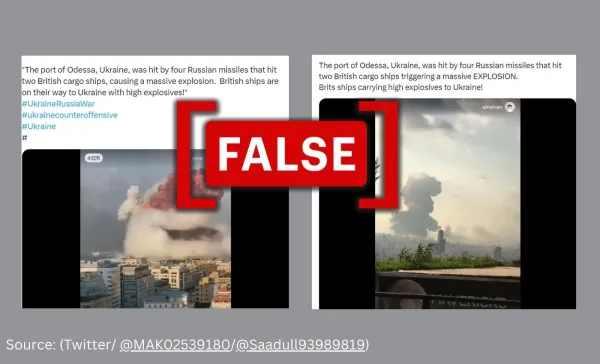By: Vivek J
August 1 2023

These videos show an explosion in the Lebanese capital Beirut in 2020, not from the port of Odesa in Ukraine.
Context
Russian forces heavily attacked the Ukrainian port city of Odesa in the Black Sea region in late July 2023. Several reports citing officials from the city claim damage to various buildings and installations in Odesa, including structural damage to many of the vital port installations.
Amid this, videos have gone viral on social media platforms like X (formerly Twitter) and Facebook, purporting to show a massive explosion triggered after Russian missiles struck two British ships carrying high explosive ammunition. The caption of one post reads, “Port of Odesa Ukraine hit by four Russian missiles. Behind the building were parked British cargo ships carrying high explosive ammunition 4 Ukrainian army @OfficialDGISPR Gen Asim Munir is advised 2 keep away from Ukrainian war.” Multiple other video clips are circulating online with similar captions. Archives of such posts can be seen here, here and here.
However, there are no reports of British ships being hit by Russian missiles in Odesa, and the videos being shared are old.
In fact
We searched for reports of an explosion in Odesa involving British ships but found no credible reports of such an incident. There are no reports of British ships carrying explosives near Odesa in the Black Sea region. However, we came across multiple news reports of Britain warning of Russian attacks on civilian vessels in the Black Sea and Russia laying additional underwater mines close to Ukrainian ports.
We also came across news reports of the Russian Navy creating a Naval blockade in the Black Sea, only allowing Ukraine to export grain through its Black Sea ports as part of the deal struck in July 2022. However, there are no reports of British or other NATO country ships with weapons or explosive ammunition reaching Ukrainian ports in the black sea.
What about the video?
We searched for videos claiming to show British ships being blown up. We found several news reports and social media posts featuring the same videos or stills dating back to August 2020. One video found on X was uploaded dated August 5, 2020, that claimed this footage was from @dogpalacelebannon. In this clip, we can also see the signboard that reads “Maverick’s Cafe Bar.” Using Google Maps, we confirmed that these two buildings are adjacent and in Beirut.
Similarly, we found YouTube videos uploaded by The Telegraph, and Sky News, all of which confirmed that the now-viral videos are from August 2020. There was also a 12-minute video uploaded on YouTube dated August 5, 2020, that featured clips of the Beirut explosion from various angles. This video contained most of the viral clips seen in July 2023.
The explosion in the Lebanese capital was caused as a result of a fire that broke out in one of the warehouses in the port of Beirut. Reports indicate that over 2,700 tons of ammonium nitrate were in the warehouse, which resulted in a massive explosion that was heard hundreds of miles away and led to a smoke cloud.
The verdict
There are no reports of Russian missile strikes on British ships in the Black Sea region. Videos claiming to show an explosion at the port of Odesa in the Ukrainian Black Sea region are actually from the Beirut port explosion in August 2020. This video predates the Russian invasion of Ukraine on February 24, 2022; therefore, we have marked this claim as false.